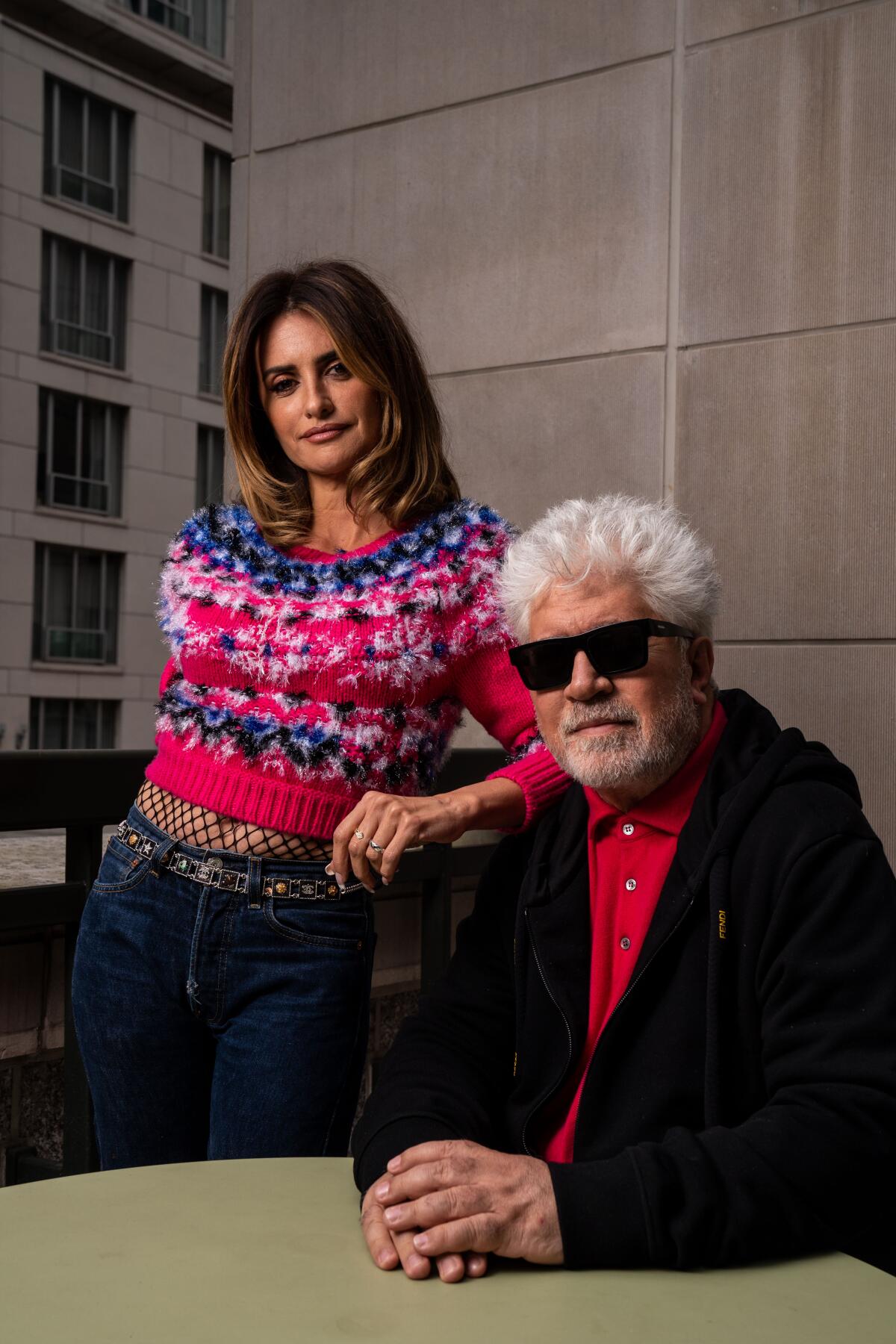With ‘Parallel Mothers,’ Pedro Almodóvar ties in personal and historical emotions

- Share via
There is an immediate assumption in watching a preview for Pedro Almodóvar’s celebrated new drama “Parallel Mothers” of what will transpire between two women (Penélope Cruz and Milena Smit) who meet in the maternity ward. But that emotional twist is just one of the film’s plot points.
The other adds a darker, historical undercurrent to the picture: a real-life campaign by citizens, such as Cruz’s character Janis, to excavate the unmarked graves of tens of thousands of people killed under the brutal regime of Francisco Franco decades before.
“In general, in Spain, the families don’t talk about the civil war,” Almodóvar says. “During the dictatorship, for that 40 years, it was an absolute silence. The families never talked about it because they were afraid of reprisals, and that silence became like pathological.”
For the film, though, the writer-director created Janis as a woman raised by her grandmother after the girl’s hippie mother disappeared. “That was the best way to make this link” between the generations, Almodóvar says, and to show why Janis would fight for the excavations.
“Parallel Mothers” is Almodóvar’s seventh collaboration with Cruz. And while he admits he did think of her specifically while writing it, that hasn’t always been the case with the two. He notes, “The only script that I wrote thinking about actors in advance was Antonio [Banderas for] ‘Tie Me Up! Tie Me Down!’ Carmen Maura for ‘Women on the Verge of a Nervous Breakdown.’ And for Penelope, this one and ‘Volver.’ The rest, no.”
Despite their long working relationship, Almodóvar says the two don’t necessarily have a shorthand. Essentially, he believes he gives her more direction than any actor he consistently works with. Then again, that’s likely because Cruz wants a lot more information than many of her peers.
“She’s also an actor that it really takes her a while to come in contact with her character, so she likes to use a lot of rehearsal time,” Almodóvar says. “I also like a lot of rehearsal time. In fact, we rehearsed the film from beginning to end as if it was a theater play. Three times before we even started shooting. It’s a way of giving her a kind of security and also just to be secure myself. Especially this character, I knew since the beginning that it was very tough for her and very complex because she’s a mother. She has two kids, 7 and 10, but her way of motherhood is completely different.”
Janis is also a character riddled with guilt and shame. Almodóvar says that Cruz is an actress who wants to viscerally experience what her character is feeling in the moment. During the first rehearsal she was so moved, she was crying much of the time.
“I said, ‘No, Penélope, you cannot cry. The guiltiness [of the character] is a kind of feeling that drains your tears,’” Almodóvar says. “My work as a director, it was basically just to experiment with her to keep the emotions in continuous contradiction. I knew since the beginning that it was very difficult, so we rehearsed a lot.
“It’s a good relationship because we are very close friends,” he adds. “We love each other. We see each other very often, but it’s a relationship based in work because she’s a hard worker.”
The journey of “Parallel Mothers” to the screen has already brought great joy, with Cruz winning the actress award at the 2021 Venice Film Festival, but it also has brought genuine frustration. In a situation that seems as though it was pulled from one of Almodóvar’s own melodramas, the Spanish film academy decided not to submit “Mothers” as Spain’s international film Oscar contender.
Instead, Fernando León de Aranoa’s “The Good Boss,” starring Cruz’s husband, Javier Bardem, was selected. Almost 20 years ago, another acclaimed Almodóvar film, “Talk to Her,” was passed over by the Spanish academy. That year, they chose, yes, a film directed by Aranoa also starring Bardem, “Mondays in the Sun.” Nonetheless, Oscar voters honored “Talk to Her” with directing and original screenplay nominations, with Almodóvar winning the latter category. “Mondays” didn’t even make the shortlist for the foreign-language film category, as it was then known.
Almodóvar says his immediate response is to assume the snub of “Mothers” was a political decision because of the film’s subject matter. The other, less likely reason he contemplates is that it might be a rejection or intolerance of him personally. That would be odd, as he’s been selected seven times by his homeland, winning in 2000 for “All About My Mother” and earning nominations in 1989 for “Women on the Verge” and just two years ago for “Pain and Glory.”
“I don’t like to think a lot about it,” he says of being passed over. “It’s a negative feeling, like, ‘They don’t love me.’ I don’t want to be like Sally Field saying, ‘Oh, you really love me. You really like me.’ No. But, it’s a fact that there is something unexplainable.”
He pauses for a moment and then adds, “I actually hope that the members of the academy here do something similar to what happened with ‘Talk to Her.’ That is, given the rejection of the film by the Spanish academy, [maybe] they’ll be more generous to it here.”
More to Read
From the Oscars to the Emmys.
Get the Envelope newsletter for exclusive awards season coverage, behind-the-scenes stories from the Envelope podcast and columnist Glenn Whipp’s must-read analysis.
You may occasionally receive promotional content from the Los Angeles Times.










